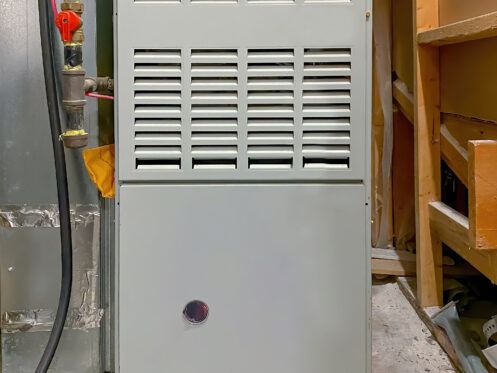When it comes time to choose the right home heating system, you have two options: gas or electricity. They both can keep your home warm in the winter months. However, each choice has its own set of benefits and disadvantages. Here is everything you need to know to find the one that meets your needs.
Differences Between Gas and Electric Furnaces
Gas and electric furnaces work in different ways to heat your home. Gas furnaces have been a popular choice for homeowners. Many people choose them because they are efficient. Plus, natural gas is less expensive than electricity. These furnaces use the combustion process to generate a lot of heat quickly. They are ideal for use in colder climates or homes with large living spaces. Along with that, gas furnaces are also easy to install and maintain. Most of the time, you only need an annual inspection and tune-ups to keep them running optimally.
On the other hand, electric furnaces are gaining in popularity. They are seen as an environmentally friendly option for heating homes. They do not produce emissions, so they are a cleaner choice than gas furnaces.
Additionally, electric furnaces are less expensive than gas furnaces. You will not need to have a dedicated gas line or storage tank. However, they do tend to be less efficient than gas furnaces. If you live in a colder climate, stick with a gas furnace.
Which One Uses the More Efficient Process?
Gas furnaces use a combustion process. When the thermostat signals the need for heat, the gas furnace ignites and heats the air. All that warm air is circulated throughout the home. A gas furnace can get warmer temperatures in a shorter timeframe than an electrical unit. While you may think the combustion process will make a lot of noise, that is not true. These furnaces operate more quietly than other options.
Electric furnaces use electricity to generate heat through a resistance process. This method is also efficient. However, you could experience some energy loss due to the conversion process. Electric furnaces also take a bit longer to reach the desired temperature.
While gas furnaces may have higher upfront costs, they can result in lower energy bills and provide more consistent and reliable heat during extreme weather conditions. Electric furnaces may be more affordable in the short term, but their energy consumption can increase over time.
Which One Is Less Costly to Install?
Another consideration is the installation costs. Gas furnaces have a higher upfront price. You will need a gas line, combustion chamber, and venting system.
With an electric furnace, there are no extensive requirements. They do not need all that extra infrastructure. Most of the time, they are easy to install. Electrical furnaces are a budget-friendly option for homeowners who don’t want to deal with expensive upfront costs.
While electric furnaces may have a lower upfront cost, they may cost more in the long run because of their higher operating costs. Electric furnaces consume more energy than gas furnaces. As a result, you will have higher monthly energy bills over time.
What Is the Greener Option?
Natural gas or propane combustion in gas furnaces is a source of carbon dioxide (CO2) emissions. These pollutants have been linked to air pollution that could cause issues resulting in climate change. While modern gas furnaces are designed to emit fewer pollutants than older models, they still create greenhouse gas emissions.
Electric furnaces are often considered more environmentally friendly. They do not produce emissions. However, you need electricity to power the furnace. Sometimes, those sources may not be considered “green” if they use fossil fuels. Fortunately, some regions use electricity from renewable sources such as solar or wind. If that is the case with your home or community, the furnace’s environmental impact can be reduced.
Additionally, electric furnaces have a longer lifespan than gas furnaces and require less maintenance. With that, you will not have to worry about parts or old units filling up landfills and creating more waste.
What About Maintenance Costs?
Since gas furnaces use natural gas, you will want to have regular maintenance performed on them. During this time, the technician will inspect the combustion chamber and look for any signs of cracks or other damage. A cracked combustion chamber is inefficient and can cause a carbon monoxide leak in your home. Every winter, this odorless gas kills numerous people.
However, the combustion chamber is not the only place where leaks can happen. The technician will take the time to inspect the entire system. Without these checks, gas could leak into your home and create a fire hazard.
Along with that, gas furnaces need the proper ventilation to remove gas fumes from the home. You never want to have a buildup of toxic gases. If there are any problems, the technician can quickly and safely fix these issues.
Electric furnaces do not have these stringent maintenance needs. Since there are no combustion components, there are fewer parts for a technician to inspect. However, that does not mean you don’t need an annual inspection. You still want to make sure all the heating components and elements are working at full performance.
Which Furnace Takes Up More Space?
Gas furnaces are known for their small and compact design. They are a great option for those with limited utility space. This advantage can help homeowners who need to optimize space utilization or have confined utility areas. You can use gas furnaces in almost any home layout.
Electric furnaces may require a larger installation area. Their design and electrical components often demand more space. You might not be able to fit this furnace in a small utility closet. However, size does depend on the manufacturer. You may be able to find one that can accommodate your smaller space needs.
Which One Is More Reliable During a Storm or Emergency?
Gas furnaces require a constant supply of natural gas to operate. While they are dependable, you may be stuck without heat during power outages or gas shortages. In emergencies, power disruptions can impact the operation of gas furnaces. However, many modern gas furnaces have electronic ignition systems that do not rely on a constant pilot light.
Electric furnaces are equipped to handle emergencies. They are not dependent on a continuous gas supply, making them more reliable during power outages. However, they are still susceptible to electrical grid failures. Homeowners living in areas prone to prolonged power outages should consider backup power solutions such as generators or battery backups to ensure the uninterrupted operation of electric furnaces during emergencies.
Whether you want a new gas or electric furnace, Level 9 Heating, Cooling, and Plumbing can help. We also offer repair, installation, and maintenance services for heating and cooling systems for both commercial and residential properties. Our team also provides plumbing services in the area. We are proud recipients of the Expertise.com award for our exceptional HVAC services in St. Louis. We also believe in giving back to our local community. If you would like to learn more about the differences between gas and electric furnaces, contact Level 9 Heating, Cooling, and Plumbing today.



